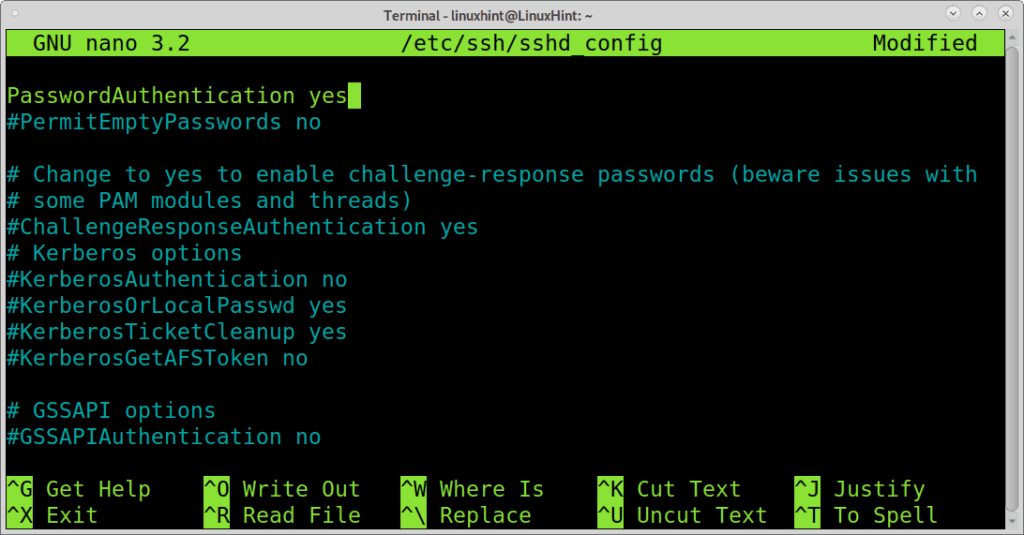
With ssh, you can configure authentication agent to save passphrase so that you won’t have to re-enter your passphrase every time you use your SSH keys. To make sure we haven't added extra keys that you weren't expecting. This way the server can only be accessed using the SSH keys you have generated. Once you have copied the SSH keys into the server and you have checked you can access it, you can disable SSH logins for the root account via SSH. This last step is optional and is intended to further improve security. Now try logging into the machine, with "ssh ' '", and check in: 5.- Disable SSH logins for the root account. $ ssh-copy-id Įnter passphrase for key '/home/jmutai/.ssh/id_rsa':

To do so follow these steps: Open up the Terminal Type in the following. To test that your new passphrase is working, copy ssh public key to a remote server and try to ssh with it. When generating SSH keys yourself under Linux, you can use the ssh-keygen command. Your identification has been saved with the new passphrase. But on the remote system if the key is placed in /home/natrium/. The same command applies when resetting the passphrase, you will be asked for the old one, and the new one to set. Viewed 3k times 7 Does ssh-keygen -t rsa work if only set for root user i.e, if the username on local system is sodium and i generate the key using the above said command and on the remote system if i place the key in /root/.ssh authorizedkeys ,this works. If using a custom path for the private key, replace ~/.ssh/id_rsa with the path to your private key. Now use the command below to set a passphrase: # ssh-keygen -p -f ~/.ssh/id_rsaĮnter new passphrase (empty for no passphrase): SHA256:1gSD3mPgxaD0C88YLU+TdYs2T3nBO5ttK5Jj0bvz0gs Finding the knownhosts File: After you have connected to a computer using ssh, the key you used to connected is. Your public key has been saved in /root/.ssh/id_rsa.pub. Your identification has been saved in /root/.ssh/id_rsa. Use the following command to copy key to remote server called " an example, let’s generate SSH key without a passphrase: # ssh-keygenĮnter file in which to save the key (/root/.ssh/id_rsa):Įnter passphrase (empty for no passphrase): You need to copy /.ssh/id_rsa.pub file to remote server so that you can login using keys instead of the password.

Also, make sure you have correct and secure permissions on /.ssh/ directory:
#LINUX SSH KEYGEN ROOT PASSWORD#
Please note that the passphrase must be different from your current password and do not share keys or passphrase with anyone. The ssh keys contains the following files This will generate SSH keys which will be stored in the "~/.ssh/" directory. In order to generate ssh keys, simply log into your Server with an SSH tool such as putty as the root user and execute the command below ssh-keygen -t rsa Generating public/private rsa key pair. But on the remote system if the key is placed in /home/natrium/.ssh authorizedkeys. Step 1: Create Authentication SSH-Keygen Keys on (192.168.0.12) First login into server 192.168.0.12 with user tecmint and generate a pair of public keys using the following command. i.e, if the username on local system is sodium and i generate the key using the above said command and on the remote system if i place the key in /root/.ssh authorizedkeys ,this works. Using keys, SSH can authenticate you to all your.

In Linux, you can use the ssh-keygen command to Generate SSH Keys.īasically, the ssh-keygen command generates, manages and converts authentication keys for ssh client and server usage. Does ssh-keygen -t rsa work if only set for root user. SSH has various authentication mechanisms and the most secure is based on keys rather than passwords. In this context, we shall look into steps to create ssh keys as follows on any Linux or UNIX-like operating systems.

#LINUX SSH KEYGEN ROOT SOFTWARE#
Here at LinuxAPT, as part of our Server Management Services, we regularly help our Customers to perform Software Installation Tasks for their Linux Server. Its function is similar to that of user names and passwords. Are you trying to generate ssh keys under Linux / UNIX operating systems for remote login?Īn SSH key is an access credential in the SSH protocol.


 0 kommentar(er)
0 kommentar(er)
